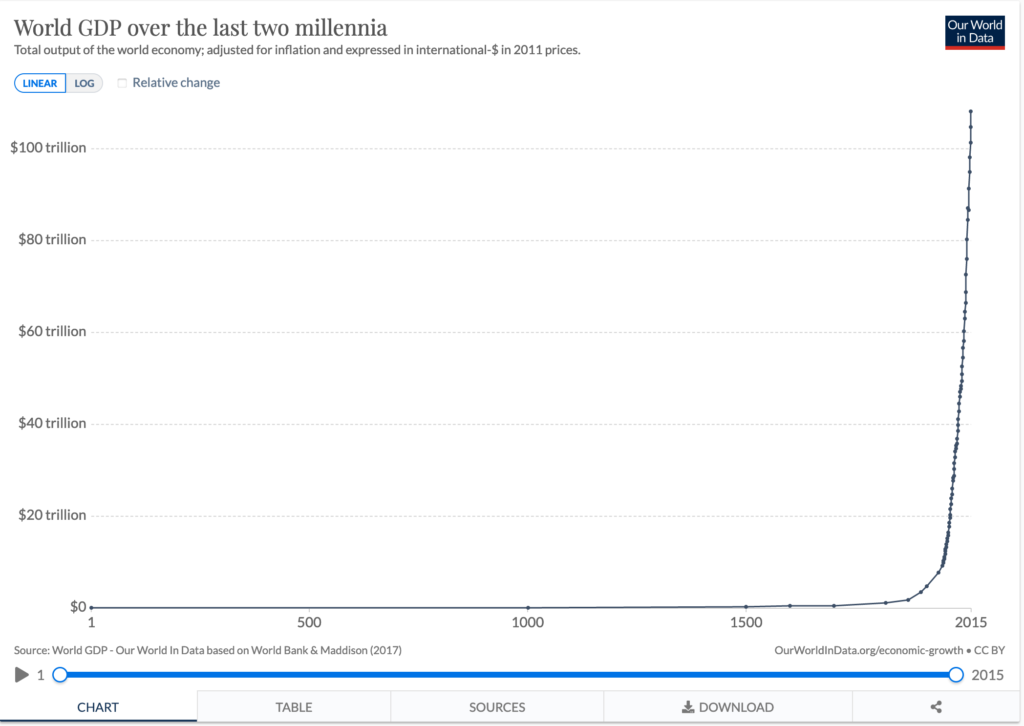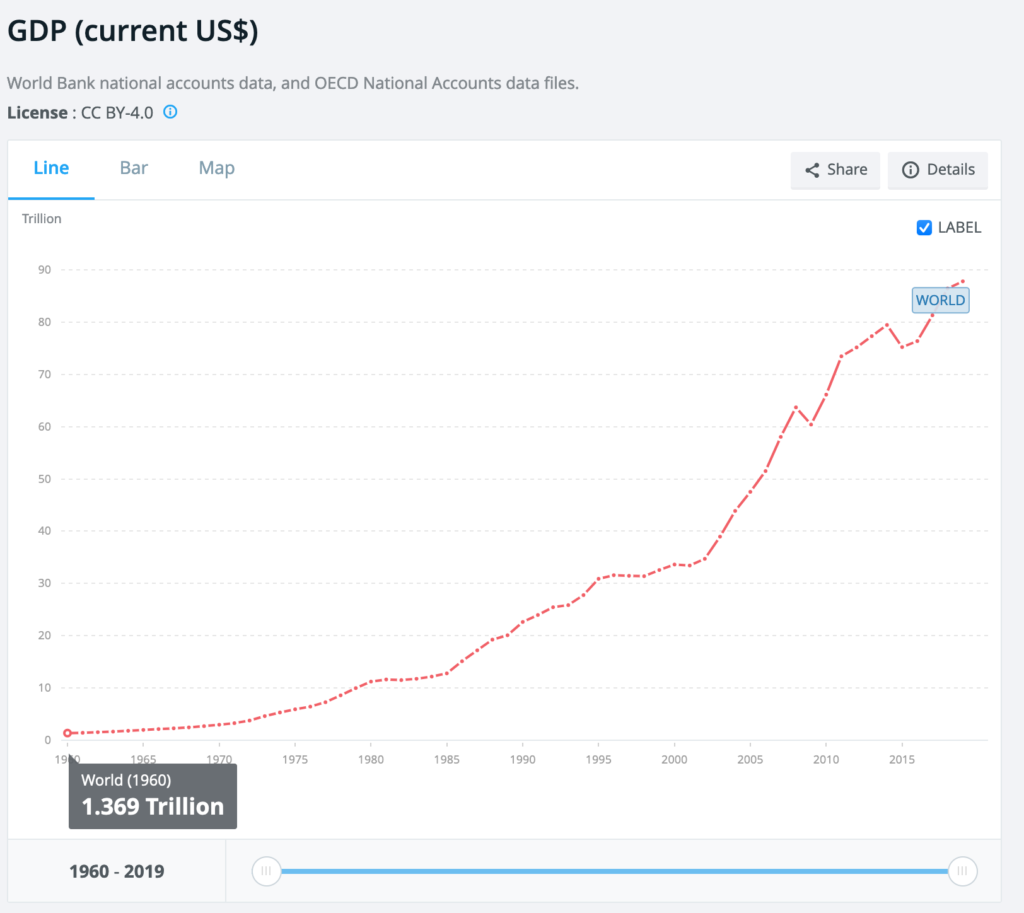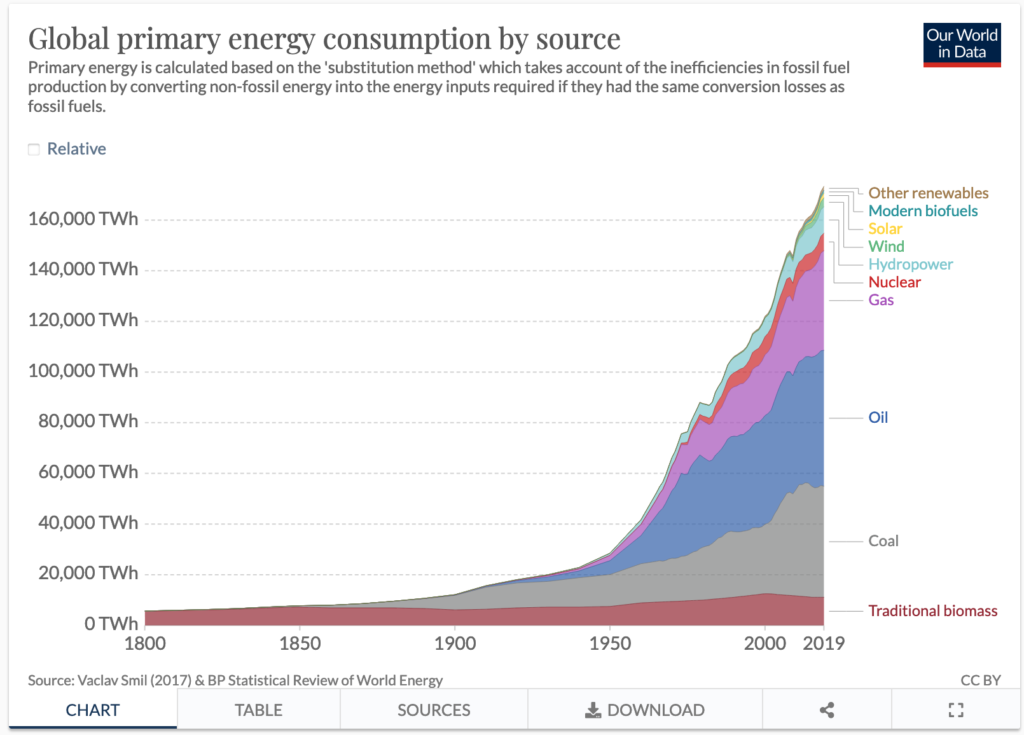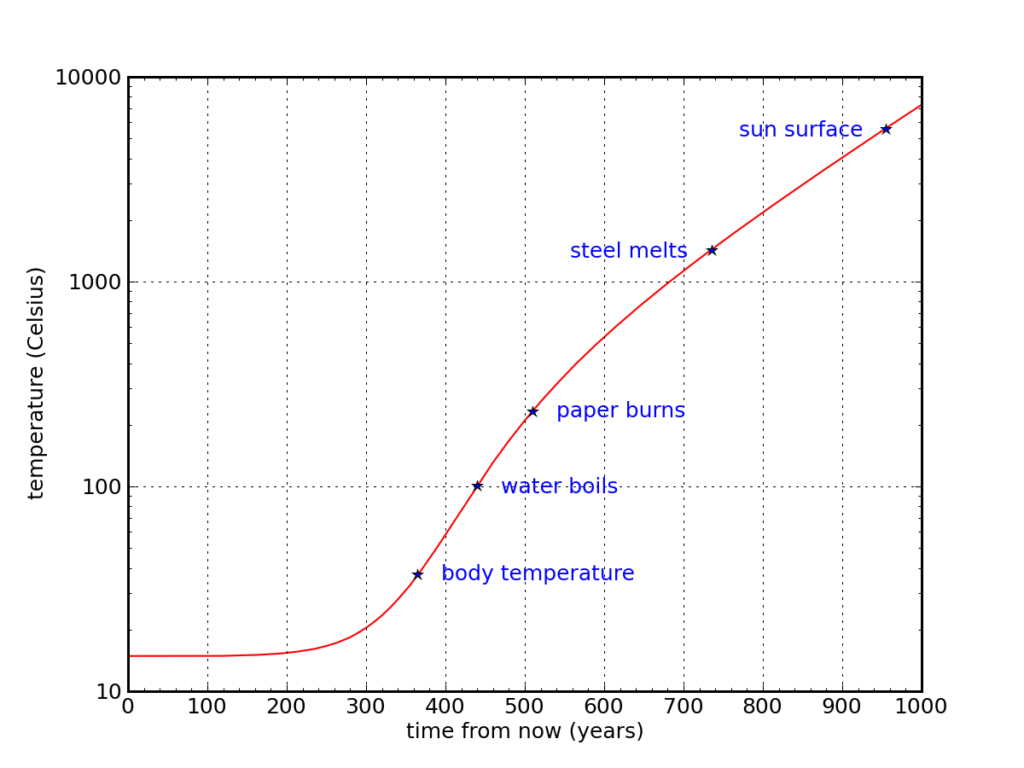Can an economy keep on growing?
post by invertedpassion · 2021-03-16T09:55:22.425Z · LW · GW · 12 commentsContents
Under this zero-sum economy scenario, perhaps we should put an upper limit on how much wealth can any single individual claim ownership of. Today we have 80 times more useful stuff than we had merely six decades ago. Surely, this sounds good. Who doesn’t want more stuff? But let’s not worry about the heat death. Let’s limit ourselves only to the near-term future. Clearly, the energy-driven limit on the physical production of goods limits the digital economy as well. None 12 comments
This is a linkpost from https://invertedpassion.com/can-an-economy-keep-on-growing/
1/ Imagine an economy that keeps on growing indefinitely. It’s essentially a non-zero-sum economy – as the pie becomes bigger, everyone becomes better as even a small percentage of a really large number is substantial.

World GDP over the last two millennia
2/ A capitalistic economy is a fantastic invention – entrepreneurs compete to give consumers more value cheaply. Markets create incentives for innovation, and innovation helps the world become richer as over time more and more human desires are satisfied.
3/ Economic wealth as measured by GDP is nothing but products and services available for purchase. Capitalism suggests these things will be up for purchase because people want them and we can make it. Hence, GDP approximates the total useful stuff available for humans.
4/ An important question to ask is if this process of innovation-led GDP growth can keep going for a long time.
And if it will ultimately come to a halt, how long can it go on?
5/ The answer to this question informs our moral choices and policies because if the economic growth engine stops and we have a fixed pie of useful stuff (i.e. GDP) to go around, the relatively less wealthy will not have any shot at becoming richer.
Under this zero-sum economy scenario, perhaps we should put an upper limit on how much wealth can any single individual claim ownership of.
5/ However, if indefinite economic growth is possible, we will have an ever-expanding pie for everyone.
Under the non-zero sum economy scenario, we should accelerate innovation because a strong case can be made towards the moral obligation for growing an economy because that’s the only way nations escape poverty.
5/ The world economy has grown at ~7.5% per year in the last six decades. This is an exponential growth rate and the math suggests that since 1960 (which incidentally isn’t very long ago – we had landed on the moon by then), our economy has grown 80 times.
6/ In fact, the data shows exactly this. In 1960, the world economy was $1.369 trillion (inflation-adjusted) and today it is $80 trillion.
Today we have 80 times more useful stuff than we had merely six decades ago.

7/ The math of exponential growth is dizzying. At the same growth rate, this means in the next 10 years we will add more (i.e. another $80 trillion) to our economy than the total we have right now (i.e. today’s $80 trillion worth of stuff).
8/ To reiterate the main question: where will this new stuff in the economy come from? How long can we keep up with the exponential growth?
9/ There are signs of economic growth slowing down. In fact, the average for the last 10 years has been in the 3% range (and not 7%).
However, with exponentials, the question usually is not of exact growth rate. As the famous wheat and chessboard story demonstrates, at any growth rate, an entity growing at an exponential rate quickly becomes insanely big.
10/ Even at a 3% growth rate, the economy would double every 23 years. This means within the next 100 years, our economy will have 16 more times stuff than today. Imagine everyone in the world being 16 times richer in the next 100 years, and being 250 times richer just in 200 years.
11/ And when I say richer, I mean in an inflation-adjusted sense. Future generations will have 250 times more things to buy and consume for the same amount of income.
Surely, this sounds good. Who doesn’t want more stuff?
12/ Given all the riches up for grabs due to exponential economic growth, we should ask ourselves:
- are there any limits to this growth?
- if there are limits to this growth, how should we act today?
- what are the costs of this growth?
13/ The question about limits to this growth has a simple but lazy answer. Eventually, the heat death of the universe puts a hard limit on how large our economy can be.
But let’s not worry about the heat death. Let’s limit ourselves only to the near-term future.
14/ A clue to the near-term limits of economic growth comes from the fact that humans are ultimately physical creatures and whatever we buy and consume requires energy.
Capitalism is a process of converting energy into work, producing entropy as a by-product.
15/ Our economies have grown in tandem with energy consumption.
Quite literally, to grow the GDP, you require energy and many economists suggest that the rapid economic growth we have seen in the last 100 years wouldn’t have been possible without the lucky discovery of fossil fuels.
Our exponential growth in the economy has required exponential growth in energy consumption.

16/ Fossil fuels will not last forever but we can have nuclear, renewables or other sources of energy.
So at least from the energetic point of view, there seem to be no limits on the size of the economy. Right?
17/ Not really. As this excellent analysis suggests, most of the energy we consume in our economy ultimately ends up as heat. Consider the car moving and vibrating air molecules, or you opening Gmail and Google’s servers heating up a bit more.
18/ In thermodynamics, there’s a simple equation that relates the amount of heat radiating to the temperature of the body radiating such heat.
Even without accounting for externalities like greenhouse gases or nuclear waste, you’ll discover that an exponential increase in energy consumption will quickly toast the earth.
19/ At a 2.3% growth rate in energy, within 1000 years, assuming all energy is consumed on Earth, the temperature of Earth’s surface will have to become equal to Sun’s surface temperature.
Clearly not a pleasant right.

20/ There are two potential counter-arguments to this line of reasoning:
a) economy’s growth gets delinked with energy growth due to increasing demand for digital goods/services (more than physical ones)?
b) what if we leave Earth and colonize space where there’s a lot more energy to go around?
21/ It’s possible that the economy has both physical and digital goods to go around, and in the future economic growth can come from digital goods.
After all, at $60k, a bitcoin (as of the time of writing this) is worth more than the price of most cars.
22/ However, it is not possible that economic growth gets completely delinked from energy growth.
All digital services require work to happen in the physical world and as long as such a digital-driven economy is growing exponentially, the energy requirement in the physical world will also grow at an exponential rate.
23/ It’s fiction that we can grow the digital economy without corresponding energy growth. Internet requires energy. Bitcoin requires a significant amount of energy. Even Minecraft requires energy.
24/ Even if the digital part of the economy grows exponentially and the physical part of the economy comes to a halt because of limited energy supply, ultimately this would mean the physical goods become infinitely cheap.
25/ But since physical goods (like microchips, fibers, etc.) are what runs the digital economy, there has to be a floor price for these (otherwise competition can destroy a company by buying up all supply of physical goods).
Clearly, the energy-driven limit on the physical production of goods limits the digital economy as well.
26/ Okay, so what if we simply expand in space and become a Kardashev level 2 civilization (using the energy of the entire solar system, including the Sun)?
Space exploration is sexy but we have to realize we have no evidence of the feasibility of anything like that. Space is demonstrably hostile to humans and distances between planets and stars are mind-bogglingly huge.
27/ Since the 1980s, the farthest humans have been to is the point (a) in the image below. Moon is the point (d) and Mars is 100 times further. “A three-day lunar journey becomes 260 days to Mars”.
See this post for more reasons why space is an infeasible option.

via
28/ We have never attempted anything like what’s required to utilize space for making more stuff for human consumption (which is what’s required to keep growing our economy without toasting Earth).
29/ That obviously doesn’t mean exploring space is a waste. Space exploration is great for advancing scientific knowledge.
But, because it’s so hostile and intractable, we cannot rely on it to power our economy anytime soon.
30/ Perhaps the reason we don’t see space-faring, advanced civilizations in space is because doing that at scale might be a million or billion times harder than what humans have achieved so far.
31/ Of course, some people will argue that physics allows it so we should be optimistic.
But I argue for realism – in absence of any evidence of utilizing space for economic growth and given how barren and unforgiving space is, we should hold our enthusiasm in check.
32/ Short aside: even if we utilize our entire solar system for powering the economy, the exponential growth will rear its ugly head again. Can we expand beyond the solar system?
The nearest star from Sun is 300,000 times farther than how far the Earth is from Sun. The Voyager probes that have reached beyond our solar system will take tens of thousands of years to reach the nearest star.
33/ To summarize, for growing our economy exponentially in the next few hundred years,
- either we toast the Earth by consuming more and more energy over time
- OR we rely on voodoo technology that doesn’t exist today.
34/ None of the two options seem realistic and hence my conclusion is that our economy’s growth will have to decelerate and finally halt within the next thousand years or so.
Much before the heat death of the universe, we will face the prospect of hitting the upper limits on human standards of living.
35/ In fact, we may not have to wait even a thousand years for our standard of life to drop.
The negative externalities of stuff we produce (such as greenhouse gases, pollution, garbage, biodiversity loss, attention loss, and so on) could pose a much bigger cost to humans than the benefit they get from producing and consuming more stuff.
36/ What does the finally stagnant economy imply morally is a difficult discussion.
But it’s definitely immoral to expect the poor nations to not grow their economies, and for poor people to not aspire for a lifestyle that rich enjoy.
37/ Perhaps the onus of making moral choices for future generations falls on the rich.
Either they can keep pushing the economy to its natural upper limit and leave consequences of that to be dealt with by future generations, or they can start making more informed choices today about what they consume, how they invest, and how much they donate.
12 comments
Comments sorted by top scores.
comment by cousin_it · 2021-03-16T14:23:26.186Z · LW(p) · GW(p)
Might be solvable with enough sci-fi technology:
- Bioengineering ourselves to live on other planets, or live differently on Earth (I'd like to be smaller and fly)
- Mind uploading, space colonization in uploaded form (send a receiver, then transmit people by radio)
- Solving population growth and arms races by worldwide cooperation / mind merging
- Quantum suicide reality editing, and otherwise using the exponential living space in quantum branches
- Writing ourselves into a mathematically possible universe with more room for growth, like in Permutation City
- Other possibilities that a smarter-than-me AI would find
comment by Pablo Villalobos (pvs) · 2021-03-16T12:09:16.178Z · LW(p) · GW(p)
Let me paraphrase your argument, to see if I've understood it correctly:
-
Physical constraints on things such as energy consumption and dissipation imply that current rates of economic growth on Earth are unsustainable in the relatively short term (<1000 years), even taking into account decoupling, etc.
-
There is a strong probability that expanding through space will not be feasible
-
Therefore, we can reasonably expect growth to end some time in the next centuries
First of all, if economic progress keeps being exponential then I think it's quite possible that technological progress will mostly continue at previous rates.
So in 100-200 years, it seems certainly possible that space expansion will become much easier, if for example genetic engineering allows humans to better tolerate space environments.
But that's pretty much a "boring world" scenario where things keep going mostly as they are now. I expect the actual state of humanity in 200 years will be extremal: either extinction or something very weird.
Material needs, entertainment, leisure... are basically all covered for most people in rich countries. If you think about what could provide a substantial increase in utility to a very rich person nowadays, I think it's down to better physical health (up to biological immortality), mental health, protection from risks... and after all of that you pretty much have to start providing enlightenment, eudaimomia or whatever if you want to improve their lives at all.
So when you have a stable population of immortal enlightened billionaires... Well, perhaps you've reached the peak of what's possible and growth is not necessary anymore. Or perhaps you've discovered a way to hack physics and energy and entropy are not important anymore.
So, even if 200 years is a short amount of time by historic standards, the next 200 years will probably produce changes big enough that physical constraints that we would reach in 300 years at current trends stop being relevant.
Replies from: invertedpassion↑ comment by invertedpassion · 2021-03-16T12:30:56.009Z · LW(p) · GW(p)
Yes, you've paraphrased the argument well.
While progress for any certain technology can certainly be exponential, the benefit or impact of it may not be exponential if we assume that the lowest hanging fruits (in terms of cost/benefit tradeoff) gets plucked first, and then it becomes harder and harder to derive economically relevant benefit even with tech progress.
What unbounded benefit relies on whether we can keep on discovering new types of general-purpose technologies, and not just an improvement in current technologies.
E.g. faster air travel depends on some new uncertain technology to be invented. We can only squeeze incremental benefits from further improving the current air travel technologies.
Also see Eroom's law which suggests declining R&D productivity for drug discovery.
Whether we can keep on discovering such general-purpose technologies is pure speculation, so there's some probability that we may actually not be in a weird cross-roads within the next 200 years.
comment by Bastiaan · 2021-03-16T19:28:58.712Z · LW(p) · GW(p)
I believe that spaceships use cooling fans to radiate off excess heat. Earth is nothing but a spaceship so I don't see why we couldn't shed heat this way if it were to become necessary.
Humans (v1.0, us) have a limited bandwidth for information intake and processing; what is left to "want" once you saturate that? This to me implies that there is also a limit to desires.
Replies from: None↑ comment by [deleted] · 2021-03-17T16:27:45.372Z · LW(p) · GW(p)
Indeed. As a quick side-note to this, this is how I address the but tHE EARTh wIlL Be OVerPOpulAteD IF we haD imMORtAlIty! argument. If a human brain needs just 20 watts, and a 'brain in a jar' life support system needed 200 watts [to keep that brain alive and functioning forever by endlessly patching it ship of thebes style], that's the limit case for how little resources you need to support 1 human. [basically a pod in a cluster in space with some sun exposure and robotics for maintenance, with everything closed loop in terms of materials used]
That might not sound like quality of life but recall that a brain in a jar setup can deliver any experience as direct impulses that the brain is capable of perceiving. Simulating a fairly complex VR world might not be all that power expensive given all the ways you can cheat...
comment by Gordon Seidoh Worley (gworley) · 2021-03-16T13:42:46.922Z · LW(p) · GW(p)
Although I don't disagree with your conclusion that growth must eventually slow, I think the limits of growth are much further off. I have some scattered thoughts on this, so maybe we can figure out what's going on if I just write them out.
The way I think of value being generated in an economy is by doing an activity I'd describe as pumping against gradients. Like, why does something have value? Because people are willing to pay for it because it would be more expensive to get it themselves (expense here to be demarcated by whatever units are meaningful to a person).
Another way to put this is that it's trading an asset for generating less local entropy.
Now eventually we could imagine a universally connected economy where local entropy = global entropy and the only thing of value is producing less entropy to do something someone cares about than would otherwise have been required. Like, I'd pay $X entropy bucks to generate Y fewer bits of entropy. But at some point it seems like we'd reach some theoretical limit on how little entropy could be used to produce the thing I care about, and this would result in a bottoming out of growth.
Growth would still happen, mind you, just that now the derivative of growth is flat.
As the universe approaches heath death, though, presumably the derivative would turn negative as we use up the remaining free energy and approach contraction.
This seems probably a long ways off, but hopefully we get there.
comment by ChristianKl · 2021-03-16T11:44:35.836Z · LW(p) · GW(p)
35/ In fact, we may not have to wait even a thousand years for our standard of life to drop.
The negative externalities of stuff we produce (such as greenhouse gases, pollution, garbage, biodiversity loss, attention loss, and so on) could pose a much bigger cost to humans than the benefit they get from producing and consuming more stuff.
This is just a matter of measuring the produced growth. It's economic growth to create filters to reduce pollution. The same goes for electric cars in cities.
Replies from: invertedpassion↑ comment by invertedpassion · 2021-03-16T12:21:44.016Z · LW(p) · GW(p)
This is interesting. I agree that the various cleanup technologies add to the economic growth.
My point was more suggestive in the sense of whether that poses a practical constraint to economic growth (in terms of say negative feedback loops) when the cost of cleanup outstrips the benefit derived (and hence putting an upper limit to the desire of the benefit).
comment by Ericf · 2021-03-16T15:16:33.136Z · LW(p) · GW(p)
So, there's no clean chart for GDP per capita on that site, which is a better metric for wealth level than raw GDP.
Also, I haven't seen any data that accounts for uncompensated labor (eg sewing your own clothes; gleaning your own wheat; or any of the other myriad pre-industrial activities. Plus child care, cooking, cleaning, etc. that continue to be mostly uncompensated today, but less so than in the past). In the toy example, if I pay you $100 to do my laundry (that would cost me $120 in time to do myself, but only costs you $80 in time) and you pay me $100 to clean your house (which would cost you $120 and me $80), GDP goes up by $200 but we are no better off than if we had exchanged chores without payment, and only $80 better off than if we had continued to do all our own work. Since industrialization has made a lot more things into cash transactions than pre-industrial, that implies that the headline GDP growth overstates the actual wealth increase.
Also, this:
https://www.smbc-comics.com/index.php?db=comics&id=2855
comment by Brendan Long (korin43) · 2021-03-16T16:50:29.459Z · LW(p) · GW(p)
5/ The answer to this question informs our moral choices and policies because if the economic growth engine stops and we have a fixed pie of useful stuff (i.e. GDP) to go around, the relatively less wealthy will not have any shot at becoming richer.
Under this zero-sum economy scenario, perhaps we should put an upper limit on how much wealth can any single individual claim ownership of.
I think you're missing a step here. How do you get from "the total amount of value stops increasing" to "the less wealthy will not have any ability to get more of that value"?
I would expect that if we actually reached a point where growth stalled, income inequality would go down (since high income in a market-based economy mostly comes from creating more value than other people). Wealth inequality would lag that, but you can't maintain wealth inequality long-term without income inequality.
Replies from: None↑ comment by [deleted] · 2021-03-17T16:39:51.657Z · LW(p) · GW(p)
Counter-example. For most of human history, extreme wealth inequality has been the norm. The 'big winners' of previous rounds set up a scenario where their direct genetic descendants enjoy the wealth they have collected. [often by taking it by force]. Kings, tribal elders, royalty, dictators - all similar patterns.
Today we have billionaires and trust funds for their children. This is functionally similar.
If growth stops, what would happen over time is very likely that the richest would use advantages over time to gradually grab a greater and greater share of the total wealth. [this is already happening even with growth]. This is because the richer you are, the more efficiencies you get at scale, and the more you can 'cheat' by outright manipulating governments. [the easiest cheat is to lobby for tax code arcana, and then hire a crew of accountants to exploit the rules]
Note that in the most recent era, the one bit of 'land' the 'peasants' have is being bought up and rented back to them.
But I will note as many have in this thread, wealth inequality is a negative but a future world with extreme wealth inequality...but biological immortality with near perfect personal safety for almost everyone...would still be far superior to a world with [fair wealth distribution] and [aging and death from random mishaps]
Replies from: korin43↑ comment by Brendan Long (korin43) · 2021-03-18T15:45:45.762Z · LW(p) · GW(p)
I think you might be making a different argument than the original article. I was reading the article as talking about market-based economies, not violence-based economies. I agree that people use whatever sources of power they have to extract wealth from other people, but if we're concerned about that we'd need to look at power in-general and not just power-from-money. This matters because the most frequent argument I see in this vein is that rich people have the potential to turn their wealth into political power which they could use to choose winners and losers and benefit their tribe, but the solution is to.. preemptively increase the power of politicians to choose winners and losers and benefit their tribe.